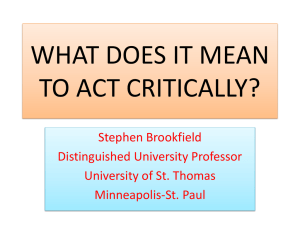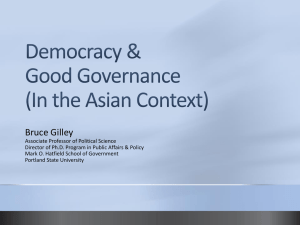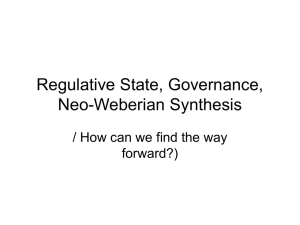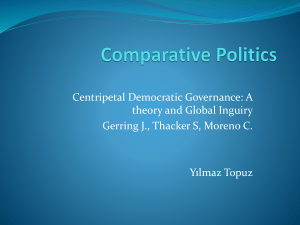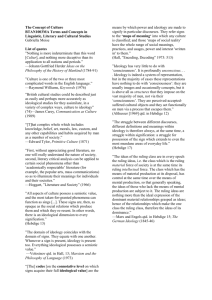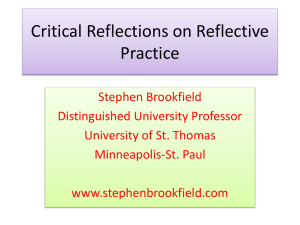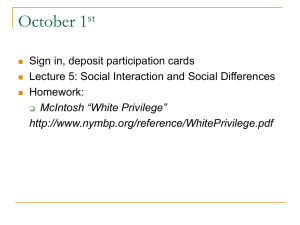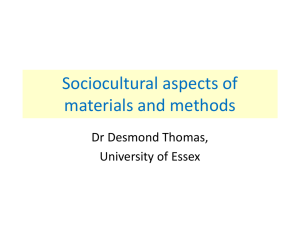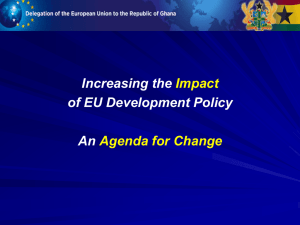Du Plessis Public engagement for good governance
advertisement
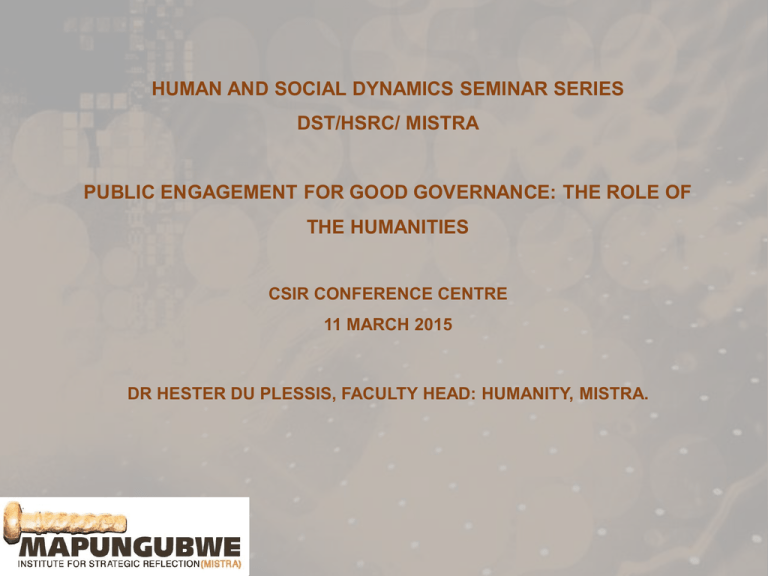
HUMAN AND SOCIAL DYNAMICS SEMINAR SERIES DST/HSRC/ MISTRA PUBLIC ENGAGEMENT FOR GOOD GOVERNANCE: THE ROLE OF THE HUMANITIES CSIR CONFERENCE CENTRE 11 MARCH 2015 DR HESTER DU PLESSIS, FACULTY HEAD: HUMANITY, MISTRA. TOPIC: POLITICAL CHALLENGES OF PUBLIC ENGAGEMENT “… the science engagement framework embraces a broad understanding of ‘science’ or ‘the sciences’ and encompasses systematic knowledge which includes natural sciences, engineering sciences, medical sciences, agricultural sciences, social sciences and humanities, indigenous sciences, technology, all aspects of the innovation chain and indigenous technologies. Public Engagement requires not only awareness and discussion of scientific or technical aspects of issues but also of the societal and attitudinal aspects as well” (Science engagement Framework Version 2 September 2013). SCIENCE ENGAGEMENT FRAMEWORK: 7.4.2 To develop a critical public which actively engages and participates in the national discourse on science and technology, thereby supporting the spirit of our participative democracy. We need to pay attention to two external factors: 1. The persuasion of ideology in the conceptualization of democracy and its impact on the public sphere. 2. The post-colonial governance system in South Africa; illustrating the difficulties in the democratic struggle for ideological freedom. IDEOLOGICAL PERSPECTIVES The persuasion of ideology in the conceptualization of democracy and its impact on the public sphere. The French Revolution left the legacy of three principles: 1. Social change is not something intrinsically objectionable, but normal and desirable. 2. The proper institution to manage the course of social change is the state. 3. States receive their legitimacy from an entity that can be referred to as ‘the people’. DIFFICULTIES IN THE DEMOCRATIC STRUGGLE FOR IDEOLOGICAL FREEDOM. Knowledge production shifted epistemological boundaries through an evolution of complexity. There exists a remarkable coincidence between the development of a more open system of knowledge production (Mode 2) and the growth of complexity in society – and here chaos theory serves as example (Helga Nowotny 2001) European Commission’s Monitoring Policy and Research Activities on Science in Society in Europe (MASIS) 2012 report (www.masis.eu) states: “Discussions and processes relating to the appropriateness of science in society should be inclusive and based on broad public and stakeholder engagement” …since… “societal challenges can only be tackled if society is fully engaged in science, technology and innovation and it should be stressed that the dynamics of public and stakeholder engagement remains an important object for further research and experimentations”. PUBLIC ENGAGEMENT 1. Shift of epistemological boundaries through an evolution of complexity. 2. Multitude of actions: ‘citizen involvement’, ‘stakeholder engagement’, ‘participatory technology assessment’, ‘indigenous people’s rights’, ‘local community consultation’, ‘NGO intervention’, ‘multi-stakeholder dialogue’, ‘access to information’ and ‘access to justice’. Three priority conditions underpinning public participation: • Access to information, • Participation in decision-making and • Judicial redress (where necessary). PUBLIC ENGAGEMENT FOR GOOD GOVERNANCE Improved governance and the empowerment of citizens are often quoted as main reasons for public engagement and participation activities, but also for a range of other reasons: • To provide a platform and meeting place for discussion and debate between the public and researchers. • To facilitate mutual learning between public and researchers. • To identify public needs and concerns. • To merge citizens’ values and opinions with the expertise of scientists, to create an increased acceptance and research agendas that are both scientifically interesting and socially robust. THE BROKEN SOCIAL COMPACT AND THE PHILOSOPHY OF DEFIANCE: A HUMANITY PERSPECTIVE “… the word resistance resonated in my desire and my imagination as the most beautiful word in the politics and history of this country, this word loaded with all the pathos of my nostalgia, as if, at any cost, I would like not to have missed blowing up trains, tanks and headquarters between 1940 and 1945 – why and how did it come to attract, like a magnet, so many other meanings, virtues, semantic or disseminal changes” Jacques Derrida (1998:2) . “ … look, if there was no resistance there would be no relations of power. Because everything would be simply a question of obedience. From the moment an individual is in the situation of not doing what they want, they must use relations of power. Resistance thus becomes first, it remains above all the forces of process, under its effect it obliges relations of power to change. I thus consider the term resistance to be the most important word, the key word of this dynamic” Michel Foucault (2001:1559-60) . DEFIANCE AND RESISTANCE = SOCIAL UPRISINGS In order for individuals to choose between different opinions and options three factors are required for citizen participation in politics: • resources (time, funds and civil skills), • a psychological engagement that requires and interest in politics including concern with public issues and membership in a group with shared political interests; • and recruiting networks through which citizens are politically mobilised”( Brady et all 1995) IMPROVED GOVERNANCE AND THE EMPOWERMENT OF CITIZENS Improved governance and the empowerment of citizens are often quoted as main reasons for public engagement and participation activities, but also for a range of other reasons: • To provide a platform and meeting place for discussion and debate between the public and researchers. • To facilitate mutual learning between public and researchers. • To identify public needs and concerns. • To merge citizens’ values and opinions with the expertise of scientists, to create an increased acceptance and research agendas that are both scientifically interesting and socially robust (Jan Riise 2012:284). WARNING: SOUTH AFRICA • South Africa has been called the ‘protest capital of the world’. With 122 violent protest marches over the past 3 months it is sometimes easy to forget that violent resistance has been part of the African National Congress’s (ANC) strategy of rending the Apartheid regime ungovernable and remain embedded in the political culture of the ANC (David Bruce 14 February 2014 in the Mail and Guardian). • Most grievances are around service delivery and in particular around land, housing and municipal services (water and electricity). Government corruption, lack of consultation by government, rampant crime, unemployment, policy brutality and low wages are listed as the lead causes of protests. Police statistics shows 8,000 to 11,000 ‘crowd control’ actions per year between 2004 and 2012. These protests are the political manifestation of some 27 million people in South Africa living off R799 or less per month. TWO STRATEGIC ISSUES FOR CONSIDERATION TO DEMOCRATISE THE ROLE OF SCIENCE COMMUNICATION: 1. Understanding the persuasion of ideology in the conceptualization of democracy and its impact on the public sphere. 2. Investigate the obstacles within the post-colonial democratic governance system in South Africa to assist is in illustrating the differences between a struggle for democracy and ideology. We need to understand the kind of ideology we are talking about. In this regard ample examples exist within Africa of efforts to follow specific political ideologies in efforts to ‘decolonise’ Africa. For example, numerous efforts were made to institute an African socialism which manifested in many forms through the past decades. We find that the African ideological spectrum ranges from a “… more or less pure Marxism-Leninism to populist ideas rather similar to the Russian narodiks or Gandhi in India, as well as nationalist ideology (Fanon, Cabral)” (Hettne, 1995:85) SO WHERE TO NOW? In an atmosphere of anger and discontent, the science museums, science journalism, science reporting though conferences and workshops and science communication engagements with the public is most probably ineffectual and futile. Across the globe millions are homeless and hungry and science seems to be unable to solve many of the basic problems. Given a choice, will these millions of people wait for science to assist or will they rely on common sense? Scientists’ engagement with the public is turning into: the public engagement with the scientists. THANK YOU
